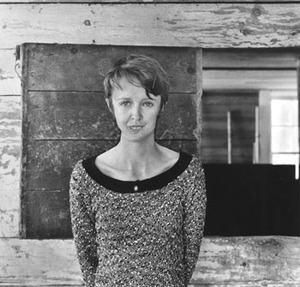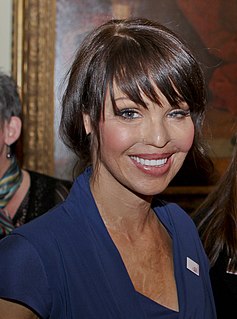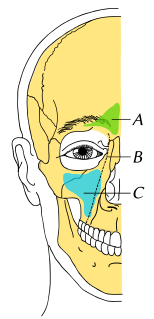
Plastic surgery is a surgical specialty involving the restoration, reconstruction, or alteration of the human body. It can be divided into two main categories: reconstructive surgery and cosmetic surgery. Reconstructive surgery includes craniofacial surgery, hand surgery, microsurgery, and the treatment of burns. While reconstructive surgery aims to reconstruct a part of the body or improve its functioning, cosmetic surgery aims at improving the appearance of it.

Christine Jorgensen was an American trans woman who was the first person to become widely known in the United States for having sex reassignment surgery.

Melissa Ellen Gilbert is an American actress, television director, producer, politician, and former president of the Screen Actors Guild.

Invisible Monsters is a novel by Chuck Palahniuk, published in 1999. It is his third novel to be published, though it was his second written novel. The novel was originally supposed to be Palahniuk's first novel to be published, but it was rejected by the publisher for being too disturbing. After the success of his novel Fight Club, Invisible Monsters was given a second chance, and a revised version of it was published. The first edition was released in paperback in 1999, and on June 11, 2012, it was published in hardcover, in a revised edition titled Invisible Monsters Remix (ISBN 978-0393083521). The novel has been adapted into a graphic novel by comic artist KGZ, a.k.a. Gabor Kiss.
Male-to-female sex reassignment surgery involves reshaping the male genitals into a form with the appearance of, and as far as possible, the function of female genitalia. Before any surgery, patients usually undergo feminizing hormone therapy, though this is not a requirement. There are associated surgeries patients may elect to undergo, including vaginoplasty, facial hair removal, facial feminization surgery, breast augmentation and various other procedures.

Breast augmentation and augmentation mammoplasty is a cosmetic surgery technique using breast-implants and fat-graft mammoplasty techniques to increase the size, change the shape, and alter the texture of the breasts of a woman. Augmentation mammoplasty is applied to correct congenital defects of the breasts and the chest wall. As an elective cosmetic surgery, primary augmentation changes the aesthetics – of size, shape, and texture – of healthy breasts.
A face transplant is a medical procedure to replace all or part of a person's face using tissue from a donor. Part of a field called "Vascularized Composite Tissue Allotransplantation" (VCA) it involves the transplantation of facial skin, the nasal structure, the nose, the lips, the muscles of facial movement used for expression, the nerves that provide sensation, and, potentially, the bones that support the face. The recipient of a face transplant will take life-long medications to suppress the immune system and fight off rejection.

Lucinda Margaret Grealy was an Irish-American poet and memoirist who wrote Autobiography of a Face in 1994. This critically acclaimed book describes her childhood and early adolescent experience with cancer of the jaw, which left her with some facial disfigurement. In a 1994 interview with Charlie Rose conducted right before she rose to the height of her fame, Grealy stated that she considered her book to be primarily about the issue of "identity."
Chin augmentation using surgical implants can alter the underlying structure of the face, providing better balance to the facial features. The specific medical terms mentoplasty and genioplasty are used to refer to the reduction and addition of material to a patient's chin. This can take the form of chin height reduction or chin rounding by osteotomy, or chin augmentation using implants. Improving the facial balance is commonly performed by enhancing the Chin using an implant inserted through the mouth. The goal is to provide a suitable projection of the chin as well as the correct height of the chin which is in balance with the other facial features.

Ann Patchett is an American author. She received the 2002 PEN/Faulkner Award and the Orange Prize for Fiction in the same year, for her novel Bel Canto. Patchett's other novels include The Patron Saint of Liars (1992), Taft (1994), The Magician's Assistant (1997), Run (2007), State of Wonder (2011), Commonwealth (2016), and The Dutch House (2019). The Dutch House was a finalist for the 2020 Pulitzer Prize for Fiction.
Renée Richards is an American ophthalmologist and former tennis player who competed on the professional circuit in the 1970s, and became widely known following male-to-female sex reassignment surgery, when she fought to compete as a woman in the 1976 US Open.

Hemifacial microsomia (HFM) is a congenital disorder that affects the development of the lower half of the face, most commonly the ears, the mouth and the mandible. It usually occurs on one side of the face, but both sides are sometimes affected. If severe, it may result in difficulties in breathing due to obstruction of the trachea—sometimes even requiring a tracheotomy. With an incidence in the range of 1:3500 to 1:4500, it is the second most common birth defect of the face, after cleft lip and cleft palate. HFM shares many similarities with Treacher Collins syndrome.
Marlie Mychele Casseus is a Haitian woman who attracted national and international media attention when she received surgery to remove a 7-kg (18-pound) growth from her face that threatened her ability to eat, hear, breathe and see.

Marisa Acocella Marchetto is an American cartoonist. She is the author of the New York Times best-selling graphic novel Ann Tenna, the graphic memoir Cancer Vixen, and Just Who the Hell is She, Anyway? She is also a cartoonist for The New Yorker and a columnist for W magazine's website. Her work has appeared in The New York Times, Glamour, and O, The Oprah Magazine.

Sin senos no hay paraíso is a RTI Colombia–Telemundo telenovela remake and loose adaptation of the original Colombian series Sin tetas no hay paraíso. The series is based on investigative journalist Gustavo Bolivar's debut novel and features an attractive young prostitute who desires to have massive breast implants in order to attract a rich cocaine smuggler. The series premiered on June 16, 2008. It is based on a true story.

Walter Ernest O'Neil Yeo was an English sailor in the First World War, who is thought to have been one of the first people to benefit from advanced plastic surgery, namely a skin flap.

Kate Elizabeth Sutton is an English writer, activist, television presenter and model from Andover, Hampshire.
María María is a Venezuelan telenovela which starred Alba Roversi and Arturo Peniche. It was produced and broadcast on Marte TV in 1990.

A Sinus implant is a medical device that is inserted into the sinus cavity. Implants can be in conjunction with sinus surgery to treat chronic sinusitis and also in sinus augmentation to increase bone structure for placement of dental implants.
Autobiography of a Face is a memoir by Lucy Grealy in which she narrates her life before and after being diagnosed with Ewing's sarcoma. The memoir describes her life from the age of nine to adulthood. In this memoir, she narrates the consequences of the disease in her emotional life as well as the physical implications that it had on her face, which resulted in a lifetime of self-consciousness. When interviewed about the novel in 1994 by Charley Rose, the author explained that the book's principal theme was identity.











